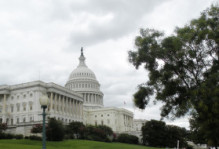DC Summer Institute – Site Visits
Guest blogger Leah Dillard provides us a summary of some of the site visits as part of the W&M DC Summer Institutes.
 Our first site visit at the Capitol Building set the scene for our visits the rest of the two weeks. The quality of these visits was unexpected; I thought we would receive a decent, brief overview of each workplace and its general functioning. I never thought we would get the chance to meet engaged, experienced, welcoming, and thorough William & Mary alumni and other professionals who would happily and selflessly show us around and answer all our questions. People like Chet Edwards, Michael Powell, and David Culver blew me away with their enthusiasm and hospitality. They treated us like privileged guests – with grace and respect – rather than like burdensome intruders. It was unreal to be treated like that by legends.
Our first site visit at the Capitol Building set the scene for our visits the rest of the two weeks. The quality of these visits was unexpected; I thought we would receive a decent, brief overview of each workplace and its general functioning. I never thought we would get the chance to meet engaged, experienced, welcoming, and thorough William & Mary alumni and other professionals who would happily and selflessly show us around and answer all our questions. People like Chet Edwards, Michael Powell, and David Culver blew me away with their enthusiasm and hospitality. They treated us like privileged guests – with grace and respect – rather than like burdensome intruders. It was unreal to be treated like that by legends.
For me, the most visually memorable site visits were media-related. I’ll always remember the remodeled, open interior of the Washington Post office and the blinking, bustling headquarters of NBC. Everyone was busy yet friendly and courteous, and the TVs and constant data monitoring made boredom impossible. I had a vague idea of how media centers function, but nothing prepared me for the beautiful organized chaos of an actual newsroom. And it was so cool to see how the Director and his team worked to piece together the news segment by segment and to watch the two NBC news anchors film their morning show. Those are experiences I detailed well in my journal and hope to remember for years to come. The same goes for our stint at DC Central Kitchen; this was probably the most memorable in terms of physical experience. It helped to have a hands-on impact and contribute to a greater cause while simultaneously learning about one of D.C.’s most permeating issues.
The most memorable site visit in terms of content was NCTA. Though the popcorn, soda, and gadgetry were all pretty cool, it was Michael Powell’s words that I’ll hold with me for years to come. His analysis of values hit close to home; he preached to the choir when he said we often sink into a relentless cycle of striving for “the next thing” – that we work to perfect our professional values and skills before working on what forms the basis of our morality and humanity. This event would have likely been just as valuable if it had occurred at the DC office; however, the formal auditorium and presentation slides emphasized the value he places in showing respect toward others with intentional visual adjustments. It legitimized his claims that he works to cultivate and maintain his personal values in everything he does.
In short, the site visits gave me physical, visual, and emotional stimulation that cannot be gained in a classroom. It was invaluable to walk in professionals’ footsteps and to see where and how they are inspired every day. At SYA, we witnessed how their open design contributed to their organization’s functioning after hearing about their mission and office dynamic, which only made our walk-through more valuable. At Sidwell, we saw how private funders, scientists, and Board members worked together to create environmentally-progressive buildings that benefit both students and the world. At the Capitol, we walked through the old Supreme Court room and Senate chamber where historic debates and decisions took place, and sat in the House where generations of famous politicians have enacted major change. This achieves a deep, impactful level of education that cannot be duplicated by reading a textbook or perusing Google Images.
Throughout these visits, our speakers gave us insightful, detailed, and honest responses to our four main questions. I say four because our social media question got pushed to the wayside. As far as memorable moments that led to their positions, most speakers – such as Regina Schofield, David Culver, Greg Schneider, and the Aspen panelists – mentioned that they took multiple jobs before utilizing their relationships and work ethics to gain their current positions. Many, like Michael Powell, also cited luck as crucial to their career progression. People typically chalk up their successes to merit, so this was refreshing in my eyes.
Most speakers saw their role in developing their organization as ideology – or vision-related. Michael Powell and Nancy Gofus, for example, both cited their leadership role as one that allows their subordinates to do their jobs efficiently, correctly, and with a shared vision. They tirelessly monitor trends to keep their organizations on a productive, positive path. Many of our speakers also abhorred firing people; I think this is a product of their general respect for others and their mission to create a supportive, cohesive space throughout the hierarchy.
Our question regarding collaboration throughout this hierarchy yielded similar responses across the board. Mamadou Gueye, Adam Anthony, and Mackenzie Moritz emphasized the importance of accepting and caring about different perspectives. Regina Schofield urged us to make the time for a collaborative space, because we need different perspectives and skill sets to make our organizations stronger and smarter. This also fosters support and respect among coworkers. At SYA, the CEO’s “office” is the couch in the center of the floor; this fosters trust, accessibility, and collaboration. In regard to the question about value dissonance, most denied having encountered an ethical dilemma. Chet Edwards mentioned yielding to his constituents when he was asked to join the Obama administration. Greg Tomlin cited the time he wanted to fire his drug-using troops but was forced by his superiors to keep them (and how he filed reports against his soldiers regardless, because he could no longer trust them). But for the most part, if our speakers smell something fishy, they avoid it or prevent it from permeating their workplace. Michael Powell, for one, said that he wouldn’t live with himself if he acted against his personal values. Tom Dillon mentioned using his position to strike anything that conflicts with his values in the first place. Several organizations, including the Aspen Institute, have strict policies that prevent the use of donations to meet biased or irresponsible ends. Generally, all speakers conveyed the value of humility, integrity and positive relationships in their answers.
On the other hand, some responses were less common. Michael Powell denounced the universal benefit of collaboration. He argued instead that we should work individually to solve problems in order to stimulate our own intellectual growth. In regard to hierarchy, he encouraged us to treat everyone with respect, to increase moral and emotional support whenever possible, and to improve peoples’ lives in ways that matter to them. David Culver and other media specialists mentioned that sometimes, the heads of certain departments call the shots without consulting lower employees. This was largely related to the urgency of their work; it also occurred in the military, understandably. Paula Reid gave us another outlier response; she said that her post-undergrad years were full of sacrifice and frustration; her jobs were terrible, but they were necessary for personal and professional growth. These responses added another dimension to our conversations and reminded me that every career path is different.
The first theme I observed throughout our site visits was that each leader valued relationships above [nearly] all else. Relationships with peers, subordinates, and superiors all held equal weight throughout the various stages of their career paths; each speaker acknowledged that they wouldn’t be the leader they are today without the guidance and help of those they once served and without the support of those who now serve them. Relationships help open opportunities, increase solidarity, and facilitate growth both personally and professionally. On a similar note, the second theme I observed was that the leaders we spoke with work to help and develop, rather than undercut, those who work for them. They don’t ride their high horse or rule from a managerial throne; they value personal interaction with their employees and the cultivation of their employees’ skills to contribute to the overall organization. Paula Reid mentioned this quality when she spoke of her most influential mentor, and Adam Anthony really emphasized this in his own work. Adam mentioned that he leads his employees through skill development and gives them different and challenging tasks to grow their skill sets. Most speakers alluded to the idea that to do the best for your organization, it’s best to support, rather than belittle, those who work for you.
A third theme I noticed was that each speaker seemed genuinely excited and/or comfortable to be where they were. Some younger speakers seemed a little stiff, but that makes sense considering they may not be as comfortable as, say, Michael Powell or Adam Anthony, since they’re younger and haven’t spent as much time in their respective workspaces. However, broadly speaking, the speakers had a confidence about them that led me to believe that everything would be okay. Whether they were soft-spoken like Dr. Jarris Taylor, boisterous like Paul Begala, young like Katherine Eklund, or entering retirement like Chet Edwards and Jeff Trammell, all had an assuring demeanor. The speakers seemed to invite us into their space and their experience. I think this is an important aspect of a natural leader; she exudes comforting authority and friendship wherever she is. And even if you would never desire their leadership position, you want to be with them wherever they go. You feel that their mission is one worth working toward. I felt that throughout these two weeks. It didn’t help me at all in determining what I want to do, but it helped me refine what kind of leader I want to be.



No comments.
Comments are currently closed. Comments are closed on all posts older than one year, and for those in our archive.